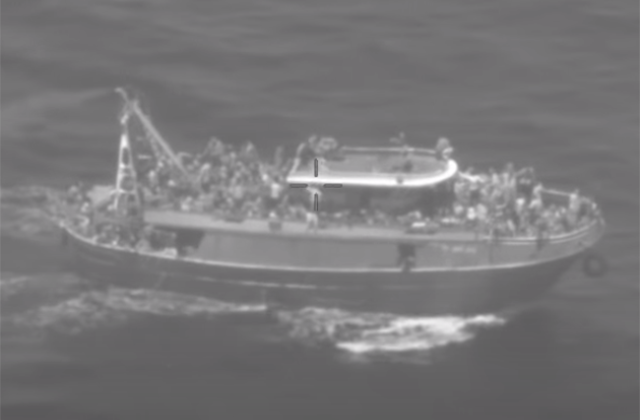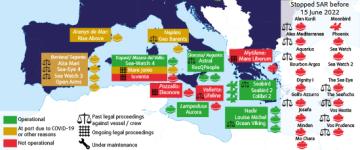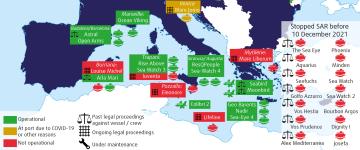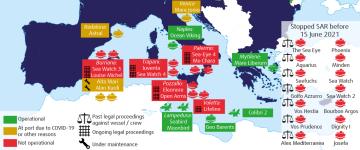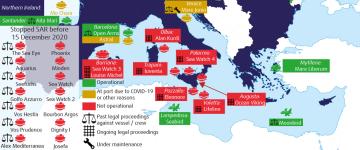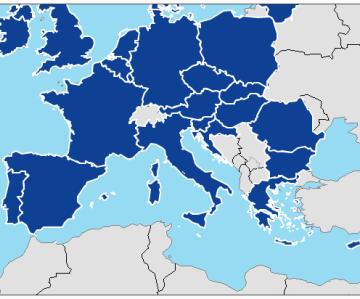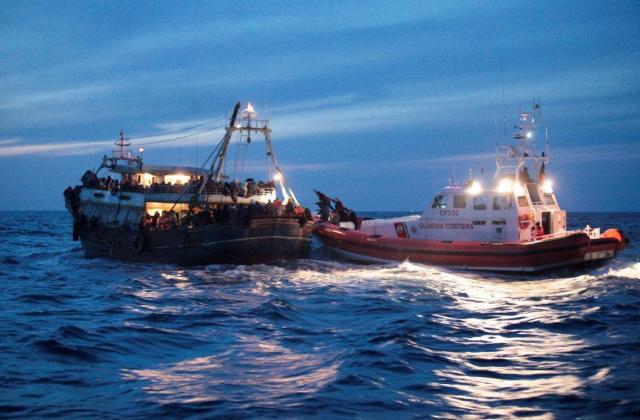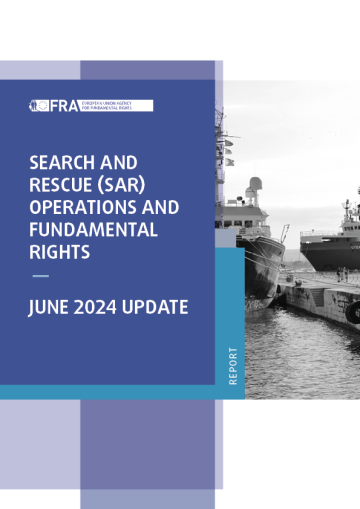
Search and rescue operations and fundamental rights - June 2024 update
Search inside this publication
- Introduction
- 1. International and EU legal framework on SAR at sea
- 2. NGO ships and aircraft involved in SAR operations
- 3. Legal proceedings against civil society actors involved in SAR operations
-
Annex: Legal proceedings by EU Member States against civil society actors involved in search and rescue (SAR) operations in the Mediterranean Sea (Update June 2024)
-
Italy
- Geo Barents, operated by Médecins Sans Frontières (MSF) – operational
- Open Arms, operated by ProActiva Open Arms – under maintenance
- Ocean Viking, operated by SOS Mediterranée – operational
- Aita Mari, operated by Salvamento Marítimo Humanitario – under maintenance
- Astral, operated by ProActiva Open Arms – under maintenance
- Louise Michel, operated by M.V. Louise Michel – under maintenance
- Mare Jonio, operated by Mediterranea Saving Humans – under maintenance
- Sea-Eye 4, operated by Sea-Eye – blocked at port
- Aurora, operated by Sea-Watch – operational
- Sea-Watch 5, operated by Sea-Watch – operational
- Seabird 1 & 2, reconnaissance aircraft operated by Sea-Watch – operational
- Sea-Watch 4, operated by Sea-Watch in collaboration with MSF – not operational
- Sea-Watch 3, operated by Sea-Watch – not operational
- Humanity 1, operated by SOS Humanity – operational
- Iuventa, operated by Jugend Rettet – not operational
- Alan Kurdi, operated by Sea-Eye – no longer operational
- Vos Hestia, operated by Save the Children – not operational
- Vos Prudence, operated by Médecins sans frontières (MSF) – not operational
- Moonbird, reconnaissance aircraft operated by Sea-Watch with Humanitarian Pilots Initiative – not operational
- Alex Mediterranea, operated by Mediterranea Saving Humans – no longer operational
- Eleonore, operated by Mission Lifeline – not operational
- Aquarius, operated by SOS Mediterranée with MSF – not operational
- Golfo Azzurro, operated by ProActiva Open Arms – not operational
- Spain
- Germany
- The Netherlands
-
Malta
- Lifeline, operated by Mission Lifeline – not operational
- Sea-Eye, operated by Sea-Eye – not operational
- Seefuchs, operated by Sea-Eye – not operational
- Sea-Watch 3, operated by Sea-Watch – not operational
- Moonbird, reconnaissance aircraft operated by Sea-Watch with Humanitarian Pilots Initiative – operational
-
Italy
- About this publication
The International Organization for Migration has estimated that from 2014 to the end of May 2024, over 29,800 people died or went missing while attempting to cross the Mediterranean Sea to reach Europe. These individuals sought to escape war or persecution or to pursue a better life.
By engaging in search and rescue (SAR) operations at sea, civil society organisations play a key role in saving lives and mitigating the hardships that migrants and asylum seekers experience.
Since 2018, national authorities have begun administrative and criminal proceedings against crew members or vessels involved in SAR operations at sea. This paper provides an overview of criminal investigations and other legal proceedings initiated by European Union (EU) Member States against civil society organisations deploying SAR vessels and aircraft in the Mediterranean and/or against individual crew members.
In 2023–2024, this phenomenon concerned the Central Mediterranean, the maritime area where most fatalities at sea occur and where civil society deploy their assets. During the reporting period, they were not present in other areas, such as the Aegean Sea or the Spanish SAR zone.
FRA published a note in October 2018 on Fundamental rights considerations: NGO ships involved in search and rescue in the Mediterranean and criminal investigations. Since then, the Agency has been publishing regular updates on NGO ships involved in SAR operations and the status of legal proceedings against them (see Products | European Union Agency for Fundamental Rights (europa.eu).
This update aims to contribute to discussions on the need for sufficient and effective SAR capacities at sea by providing an overview of the difficulties faced by civil society in their efforts to prevent deaths at sea. These discussions are taking place within the European Contact Group on Search and Rescue and in the context of Frontex operations at sea.






